You’re ready to start a music blog, but you have no idea where to begin. No worries. Starting a music blog requires just six simple steps. This guide teaches you those steps plus shows you how to create a music blog that makes money.
For the better part of a decade now, I’ve helped hundreds of new bloggers start blogs from scratch. My top tip for starting a music blog is this: Build your blog on a reliable and flexible blogging platform.
I recommend using a self-hosted WordPress website to launch your new music blog. WordPress is the most powerful and versatile blogging platform on the planet. My favorite hosting solution for a WordPress blog is Bluehost. You can count on Bluehost to offer reliable and secure blog hosting without breaking the bank. With Bluehost, you can launch your music blog for as low as $2.95 a month.
There are just six simple steps to starting and monetizing a music blog. They are:
1. Choose Your Niche
As a budding music blogger, the main question you must ask yourself in this first step is, “What kind of music blog do I want to start?” Now is the time to get crystal clear regarding which subjects you’ll include on your blog and who your ideal blog audience is.
Examples of Music Blog Niches
A niche is a specific subject area or overarching theme that you intend to focus on throughout your blog. There are several types of music blog niches. Your niche can range from somewhat narrow to extremely narrow. For example, your blogging niche could be the entire genre of hip-hop music, or it could choose to focus exclusively on hip-hop artists in Boise.
Here are a few niche ideas that may help you clarify your blogging niche:
- A specific music genre, such as hip-hop, metal, rock, rap, or dance music
- Music industry news and trends
- Music facts and trivia
- Music technology
- New music
- Local or independent artists
- Reviews of recorded music
- Music festivals, concerts, and events
- Music lessons or performance techniques
- Specific musical instruments
- Your band or your music
Choose a niche that you feel passionate about and feel certain you can create content for over the long run. Do your homework by researching other music blogs in the niches you’re considering. Learn from what others do well and not-so-well, and search for opportunities to create something more extraordinary than anything else on the internet today.
The biggest mistake you can make right now is trying to cover every genre and every type of music. It’s simply too difficult to focus on the full depth and breadth of the music world. If you try, it will confuse site visitors. That’s why the most successful music blogs typically focus on a relatively narrow niche.
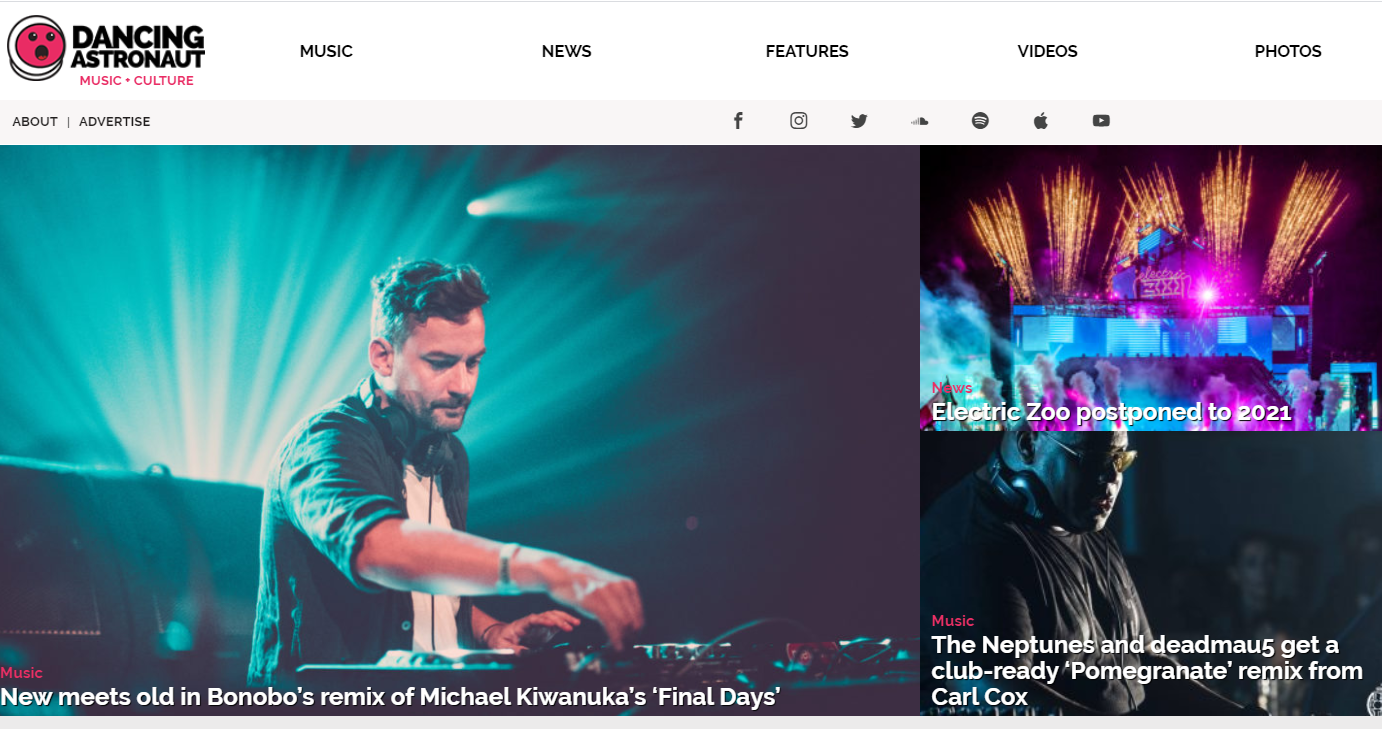
The Dancing Astronaut blog’s niche is the global dance music community.
(Source: dancingastronaut.com)
Who Is Your Ideal Audience for Your Music Blog?
As you consider which niche you want to pursue, you must also think about who the ideal audience is for your blog. Think long and hard about who will be most eager to visit your site and keep coming back for more.
Here are a few examples of audiences your music blog could target:
- Fans of a specific music genre
- Music fans of a certain age
- Music fans in one particular region or city
- Fans of your music or your band
- Professional musicians
- Amateur musicians
- Music teachers
- Music students
- DJs
Consider where your ideal audience hangs out online now. How are those people currently getting their desire for music news and information met? What types of content interests them the most? The better you understand your target audience’s needs, wants, and interests, the more success you’ll have as a music blogger.
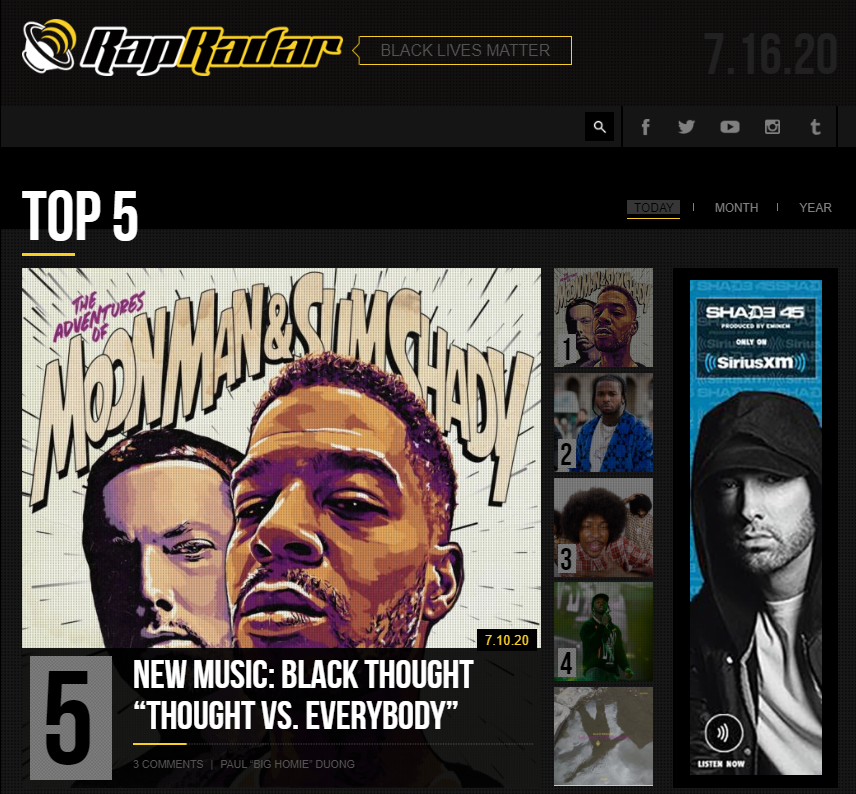
Rap music fans are the target audience for the Rap Radar blog.
(Source: rapradar.com)
2. Establish Goals & Select Monetization Strategies
Step two to starting a music blog is setting goals and deciding how you’ll monetize your blog. You may be tempted to skip this step and proceed to blog platform selection and set up, but I strongly advise against that. I find that bloggers who take the time to develop a well-defined blog business plan achieve far greater success than those who launch blogs using the unreliable “just wing it” strategy.
Here are some specific goals top music bloggers often share:
- Make money blogging
- Gain attention for your music
- Promote your music services — such as DJ or music producer services
- Become an online influencer
- Get free access to concerts, festivals, and events
- Land gigs in the music industry
Set aside a little time to identify your top goals now, which may or may not appear on the list above.
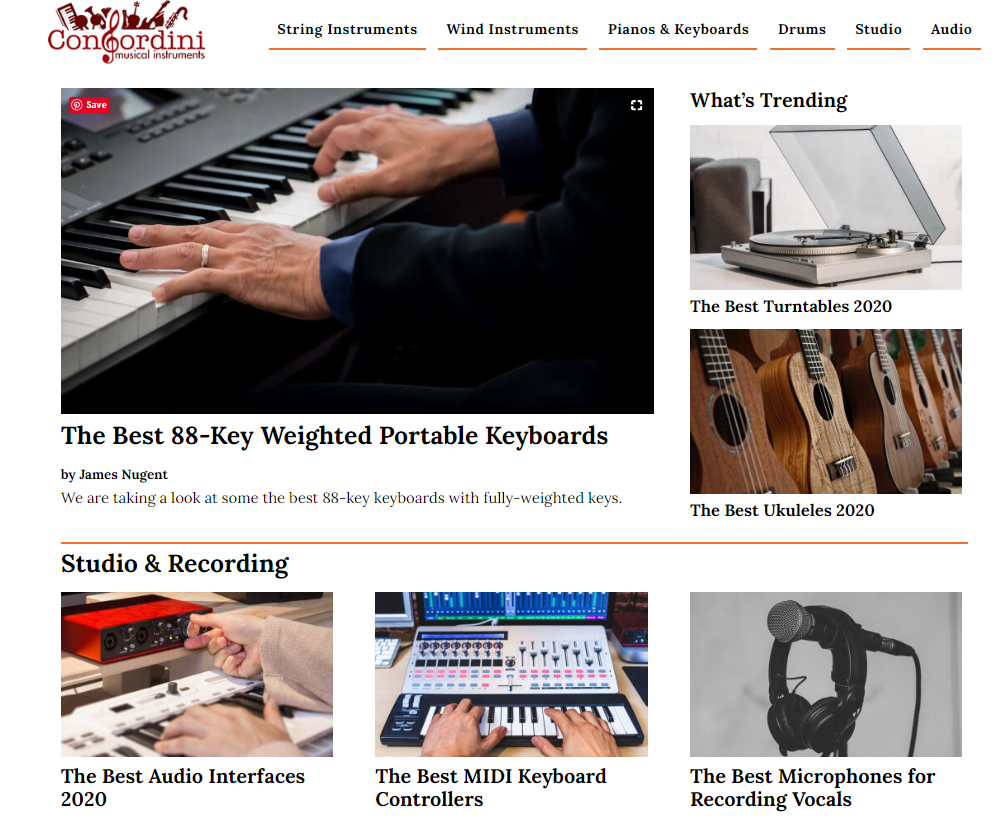
The Consordini blog features reviews of musical instruments and equipment and monetizes through affiliate marketing and advertising.
(Source: consordini.com)
Top Monetization Strategies for Music Blogs
If one of your top goals is to make money blogging, I’ve got some good news for you: there are many ways you can earn a living or a lucrative side income as a music blogger. Here are a few top monetization techniques:
- Post advertising on your site via a popular advertising network
- Create sponsored posts
- Sell music or music-related services
- Affiliate marketing — which is when you receive a fee promoting a brand, product or service
- Charge artists a fee to feature new music on your blog
- Set up an online store
Your earnings potential as a blogger will depend on many factors, including blog traffic and audience engagement. If you want to make the most money, it’s wise to use multiple monetization tactics on your blog.
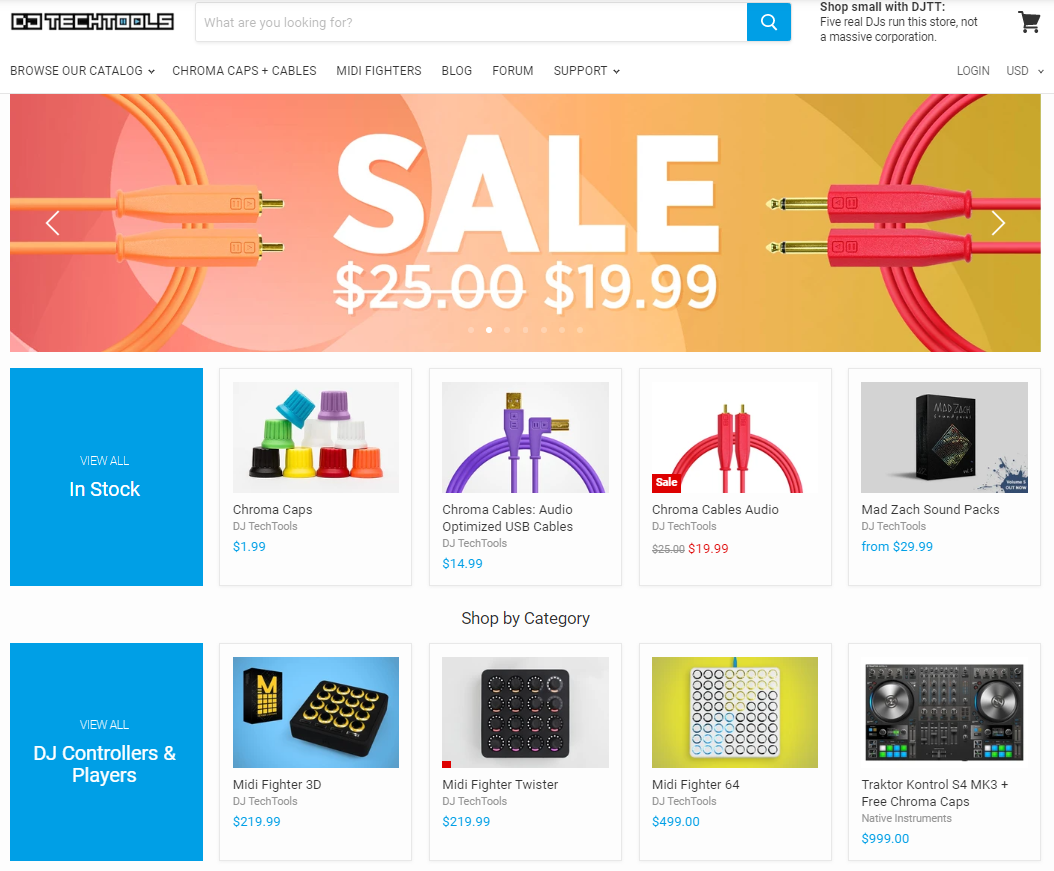
The DJ Tech Tools blog makes money through its online store for DJs.
(Source: store.djtechtools.com)
3. Choose a Blog Name & Domain
It’s time to name your blog and select a domain. Your music blog’s name is the foundation of your brand. The best blog names are short—six to 18 characters—unique, memorable, and easy to spell. Blog names that include words that indicate what the blog is about are stronger than less descriptive names.
Before settling on a name for your blog, you must check to see if the domain is available for it. You can do this now using this handy domain availability checker from Bluehost:
4.Select a Blogging Platform & Set Up Your Blog
One of the most important decisions you make in setting up your blog is which platform to use. Switching platforms down the road can be a major pain in the neck, so you’ll save yourself a lot of time and effort by launching your blog on a platform that will grow with you as your blog grows.
The best blogging platforms are stable, scalable, and easy to use. For those who want to make money blogging, I always recommend going with a self-hosted WordPress site—which is what I use when building new blogs.
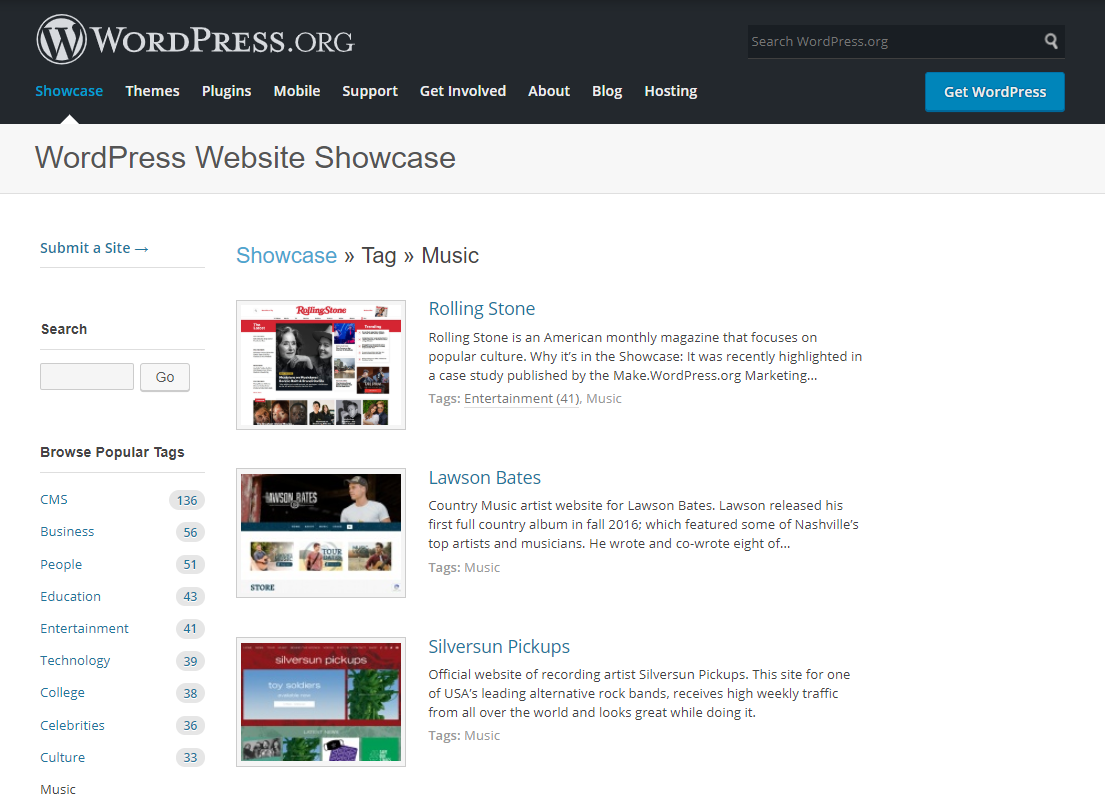
Examples of top music blogs and websites built on a self-hosted WordPress platform
(Source: wordpress.org)
WordPress is a free, open-source content management system (CMS) used by more bloggers than any other platform in the world. With WordPress, you can access thousands of design templates, themes, and plugins that allow for maximum blog customization.
You’ll need a secure and reliable hosting provider to launch your self-hosted WordPress blog. Bluehost offers hosting solutions starting at just $2.95 a month—and you’ll even get a free domain and custom email address in your first year.
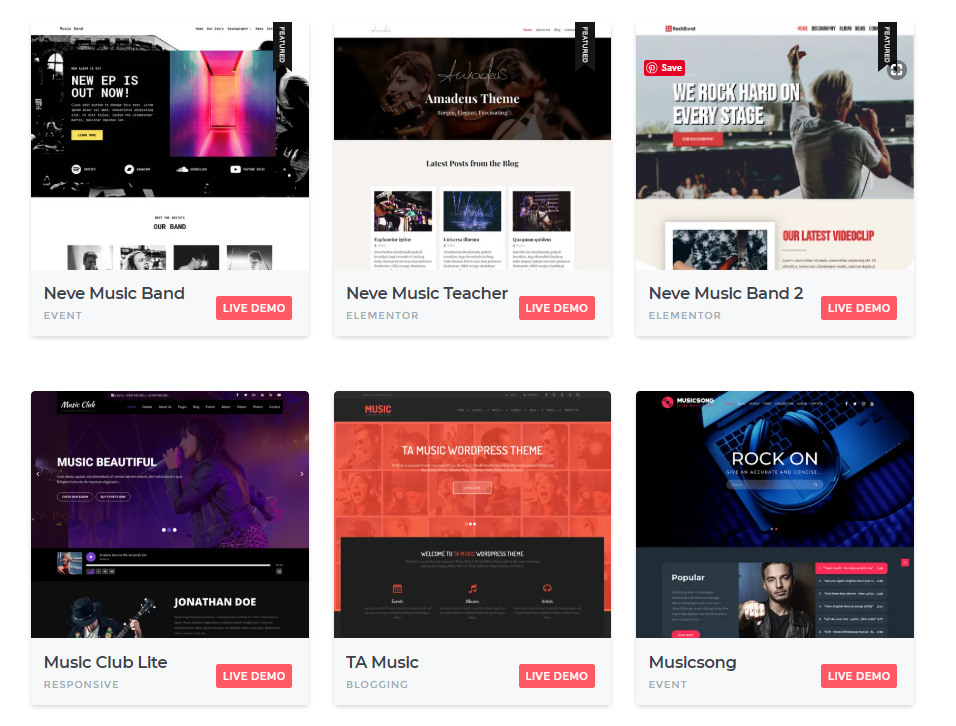
Examples of WordPress themes for music blogs
(Source: justfreethemes.com)
Set Up Your WordPress Blog
Setting up a WordPress blog is fairly straightforward. Once you’ve purchased your domain and selected a hosting provider, you’re ready to pick a WordPress theme. A theme is a design and layout guide that ensures your blog looks appealing and professional.
There are several providers from which you can obtain your theme, including StudioPress, ThemeIsle, and Elegant Themes. You’ll even find WordPress themes explicitly for music websites. On average, expect to pay from $0 to $149 for your WordPress theme.
Next, you’ll want to add some WordPress plugins to your site. Plugins are predeveloped pieces of code that make it easy to add additional features and functions to your blog.
Here are a few of the most popular plugins for WordPress blogs:
- WooCommerce: Adds ecommerce functionality to your blog so that you can set up an online store
- Akismet: Blocks spammy comments (and most blogs get a lot of these)
- Contact Form 7: Automatically creates forms that allow your blog visitors to contact you
- WordFence: Offers an extra layer of security on your blog
- Yoast SEO: Helps you optimize your blog for greater visibility in search engines
- Social Snap: Makes it easy for blog visitors to share your blog content on social channels
- Smush Image Compression and Optimization: Reduces the file size of images on your blog so your site loads quickly
- Elementor: A page layout software that makes it easy to create custom page layouts on your blog
- MemberPress: Create a free or paid membership program using this plugin
5. Develop Blog Content
You’re now ready to start developing and publishing content on your blog. You can post blog content as either a page or a blog post.
The main difference between a blog page and a post is how they’re used. Pages are typically more static and have a singular focus. Blog posts are the pieces of content you create regularly and manage via your blog editorial calendar.
Most music blogs contain these pages:
- Home Page: This is akin to your home’s front door—it’s a primary way to enter your site, though not the only way your visitors will come into your blog.
- About Page: A compelling About page tells your visitors who you are and why your blog exists.
- Contact Page: As the name implies, a contact page offers directions for how your blog visitors can get in touch with you directly.
Other pages you might want to add to your music blog include an online store page and a page that features music videos.
Tip: I don’t recommend hosting videos directly on your site. Video files are large and will slow your site plus cost you more in hosting fees. Instead, host your videos on YouTube or Vimeo, and then embed them into your music blog.
Create Compelling Blog Posts
Your blog’s success hinges on your ability to create compelling posts that engage your audience and keeps them coming back. The best blog post ideas come from paying attention to what’s going on in your blogging niche and then creating entertaining content around what’s happening.
Here are common types of content you may want to feature on your music blog:
- Best new music
- Music event discussions
- Artist interviews
- Instructional content
- Music reviews
- Music videos
- Music playlists
- Artist profiles
- Concert calendars
Most music blogs depend more heavily on videos and audios than other types of blogs. Incredible images are also a must for music blogs.
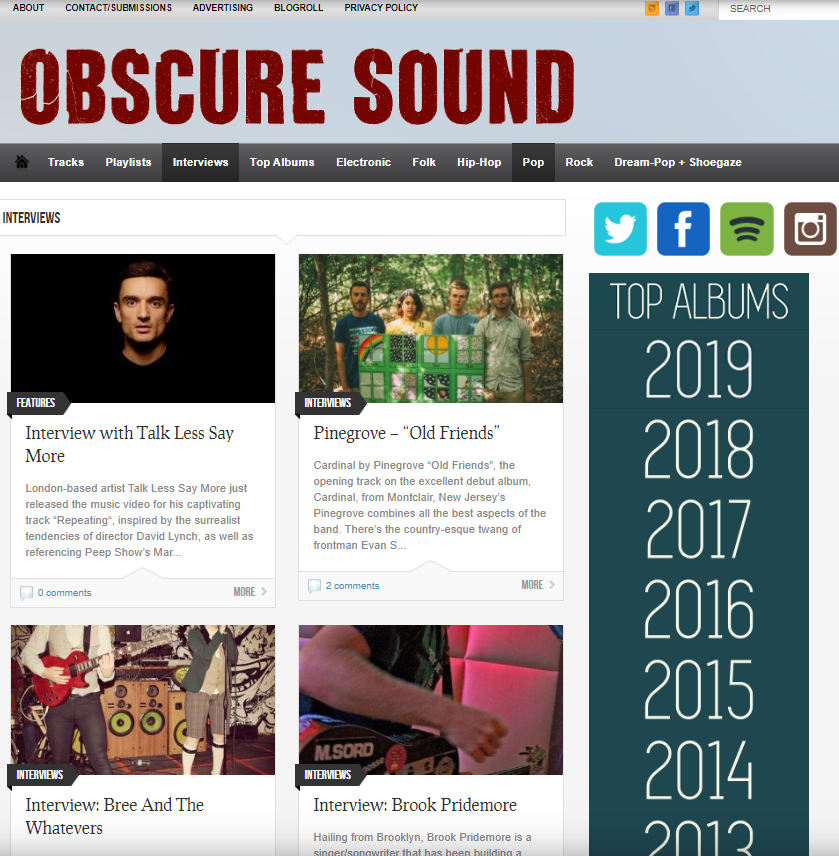
The Obscure Sound blog features interviews with indie musicians.
(Source: obscuresound.com)
Consistently Create New Content for Your Blog
The music industry is always evolving as new music, and new artists enter the spotlight all the time. That’s why it’s vital that you consistently create new content for your blog. At a minimum, you’ll want to post new content once a week. Adding new posts even more frequently may help you grow your blog faster, yet, never sacrifice content quality over quantity. If you want to stand out in the crowded world of music blogs, producing exceptional content is a must.
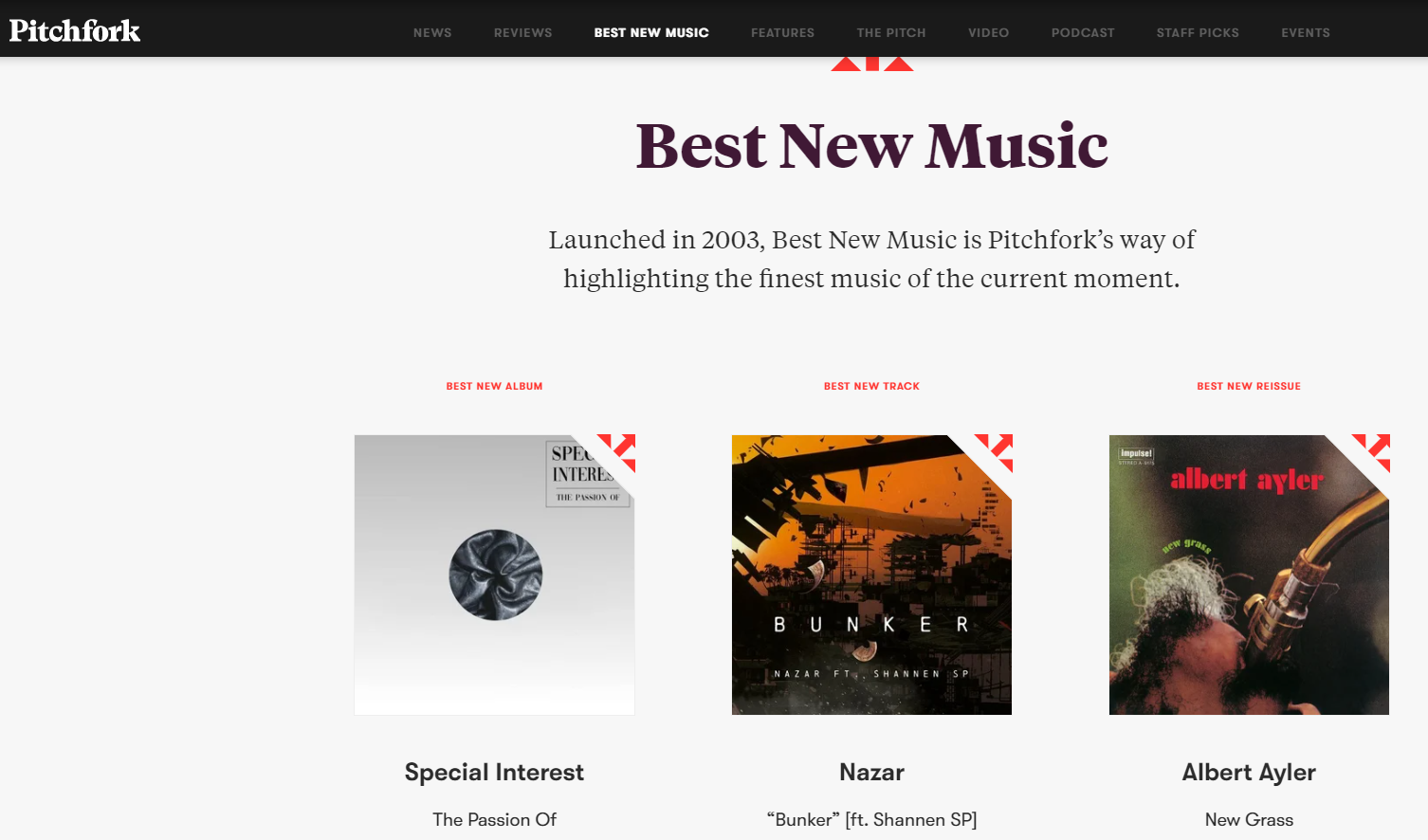
The Pitchfork music blog has a section devoted to the best new music.
(Source: pitchfork.com)
6. Get the Word Out About Your Music Blog
One of the toughest tasks you’ll face as a new music blogger is getting the word out about your blog. There are three highly effective ways to generate more blog traffic, including search engine optimization (SEO), blogger outreach, and social media.
Drive Blog Traffic With SEO
Search engine optimization is the process of making your blog more visible in search engines. Ranking higher on Google will lead to more people seeing and clicking through to your blog posts and pages.
One of the keys to effective SEO is taking the time to do keyword research—which is the process of finding and using keywords that align with content for which your ideal audience is searching.
My favorite free keyword research tools for bloggers include Google’s Keyword Planner—which you can access through your Google AdWords account—Answer the Public, Google Trends, and Ubersuggest (which also has a paid option). My favorite premium keyword research tools include ahrefs and Moz.
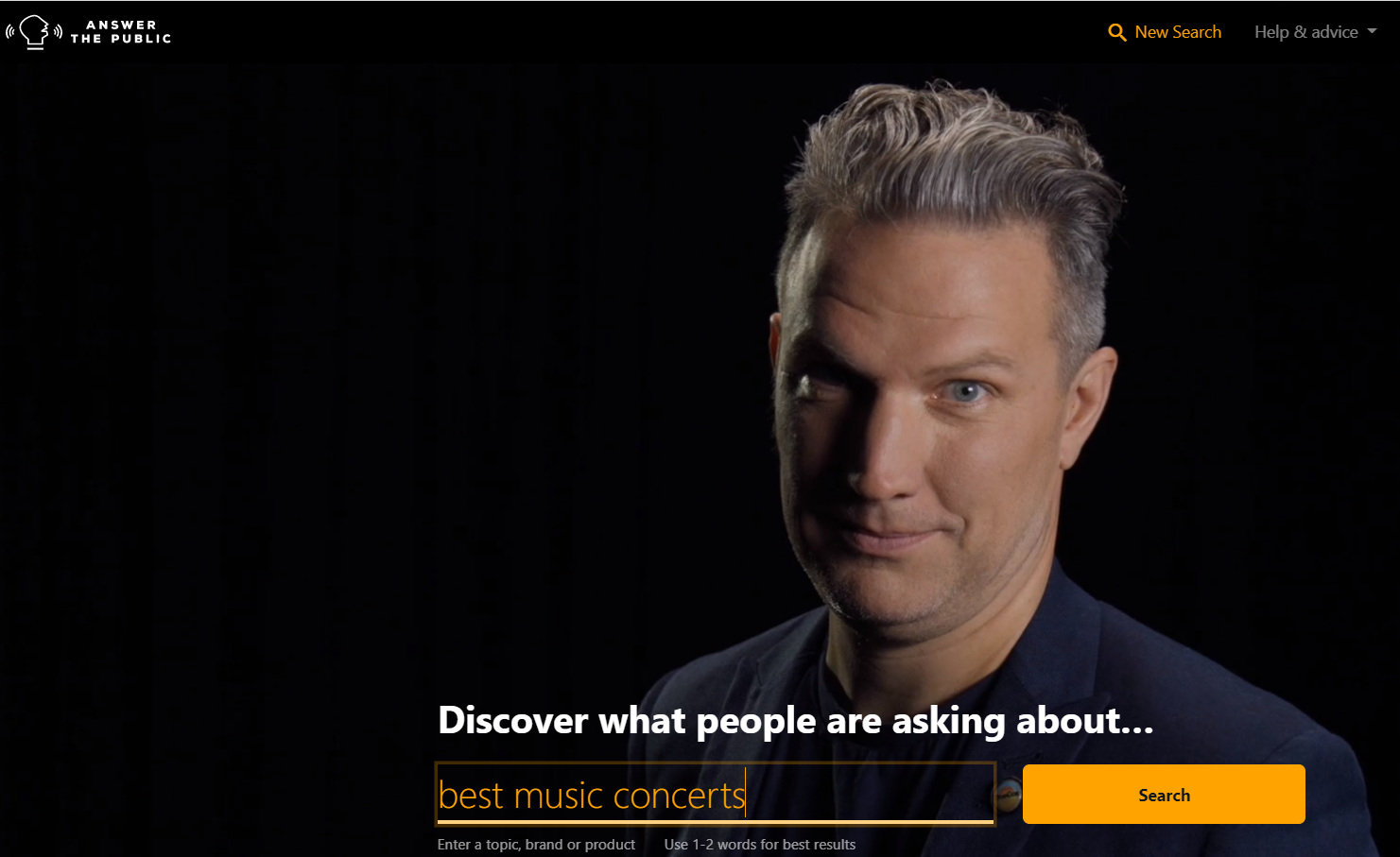
Answer the Public is a popular keyword research tool for bloggers.
(Source: answerthepublic.com)
Use Blogger Outreach to Spread the Word About Your Blog
Most music bloggers don’t have much of a following in the first few months after launching a blog. That’s why it pays to reach out to well-established bloggers and music influencers who can help you get attention for your burgeoning music blog. This process is called blog outreach.
Popular ways to conduct blog outreach include offering to write guest posts for other music blogs, appearing on music podcasts, and reaching out to influencers to offer services they need. Being helpful and providing value to others is a surefire way to grow a strong network that will support your music blog for years to come.
Promote & Market Your Blog on Social Media
You can grow a massive following for your music blog by becoming skilled at social media marketing. YouTube, Instagram, Facebook, TikTok, and Twitter are popular social platforms where you’ll likely find fans for your blog.
Since managing social media accounts can prove time-consuming, I recommend focusing on just one or two social channels when you’re just starting out. If your budget allows, you may want to hire a social media manager to help you manage social content and grow your social following.
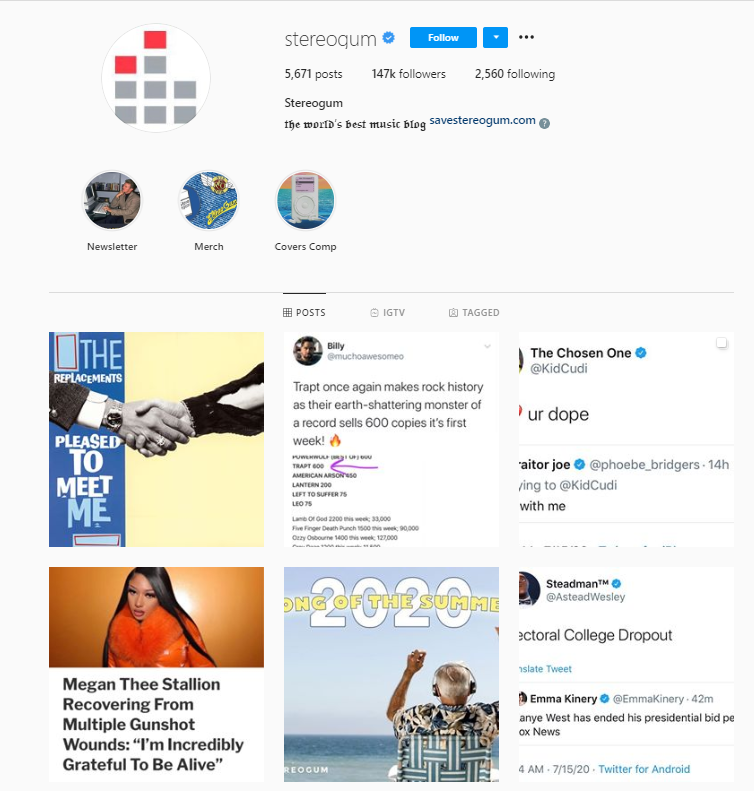
The Stereogum music blog has 147,000 followers on Instagram.
(Source: instagram.com)
Success Tips for Music Bloggers
At this point, your blog is up and running, and you’re adding new content regularly. You have all the basics down cold, but there are still a few more tips that’ll help you take your music blog to the next level.
Invite Musicians to Submit Their Music to Your Blog
You can build massive interest in your blog by inviting artists to submit music to your blog. The artists you choose to feature or review on your blog all have followings—some of which are larger than yours—and will likely share your blog posts with their followers. Plus, blog audiences enjoy hearing about new music—so sharing music is a win-win-win for you, the musicians you feature, and your blog visitors.
Create a Visual Vibe That Aligns With Your Blog’s Brand
When it comes to creating your website, don’t skimp on design. You want to develop a cohesive brand look that emits the tone and feel you want your music blog to exude. For example, the in-your-face bold design for a heavy metal music blog will be far different from the reserved, high-end look for a classical music blog.
If your design skills are limited, and your budget allows, get help developing your brand identity—which includes your logo, basic color schemes, fonts, and overall blog tone. You can find talented and affordable designers on Fiverr.
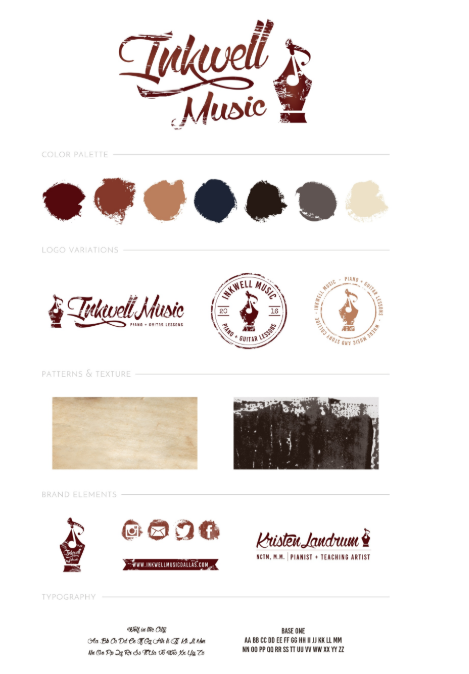
Example of a brand board for Inkwell Music
(Source: tarragonstudios.com)
Post Lots of Music Videos on Your Blog
It should come as no surprise that if you plan to blog about music, then you need to include music videos on your blog. Some music bloggers post several different types of videos on their blogs. Videos will keep your site visitors more engaged than just about any other blog content you place on your site.
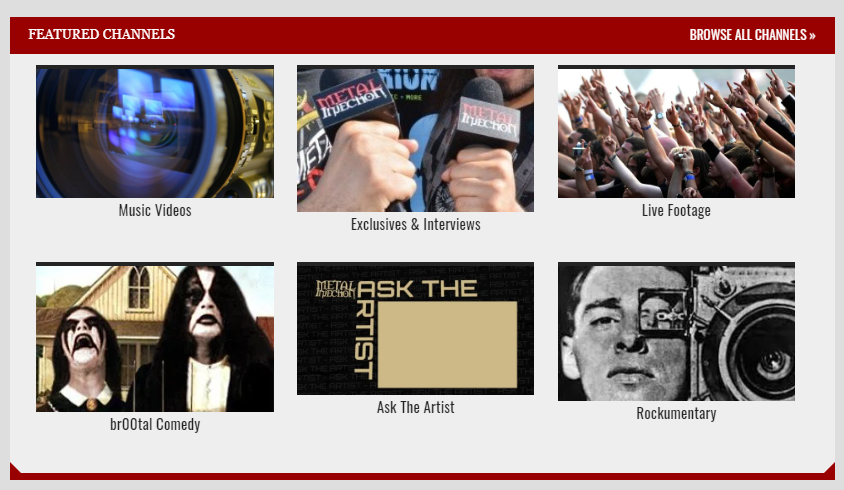
The Metal Injection blog offers six video categories.
(Source: metalinjection.net)
Create More Content More Quickly Using Guest Bloggers
Developing high-quality new blog content can be time-consuming. You can publish more content more quickly if you invite others to become guest bloggers on your site. You’ll still need to review content submitted by others to ensure it meets your quality standards, but using guest bloggers is a great way to build an information-rich music blog.
Bottom Line
Starting a music blog is as easy as selecting a music niche, choosing a name and domain, deciding on a blogging platform, and then developing blog content. Creating great content consistently and using smart monetization tactics are keys to launching a profitable music blog.
Another key to creating a phenomenal music blog is building it on a stable blogging platform that will help you scale your blog as your business grows. WordPress is the best platform for music bloggers serious about making. For optimal results, go with a self-hosted WordPress blog using Bluehost’s affordable and secure hosting solutions.